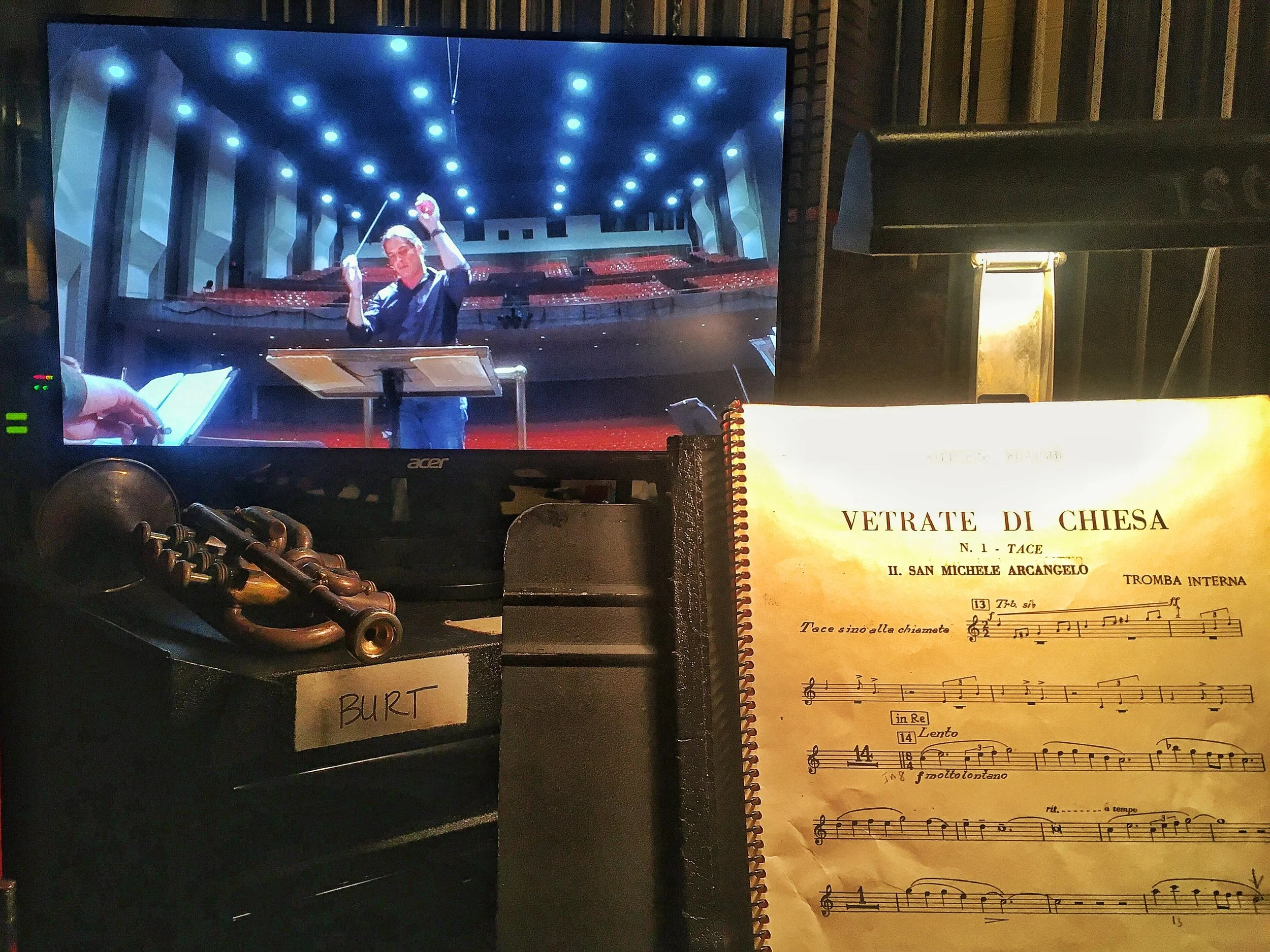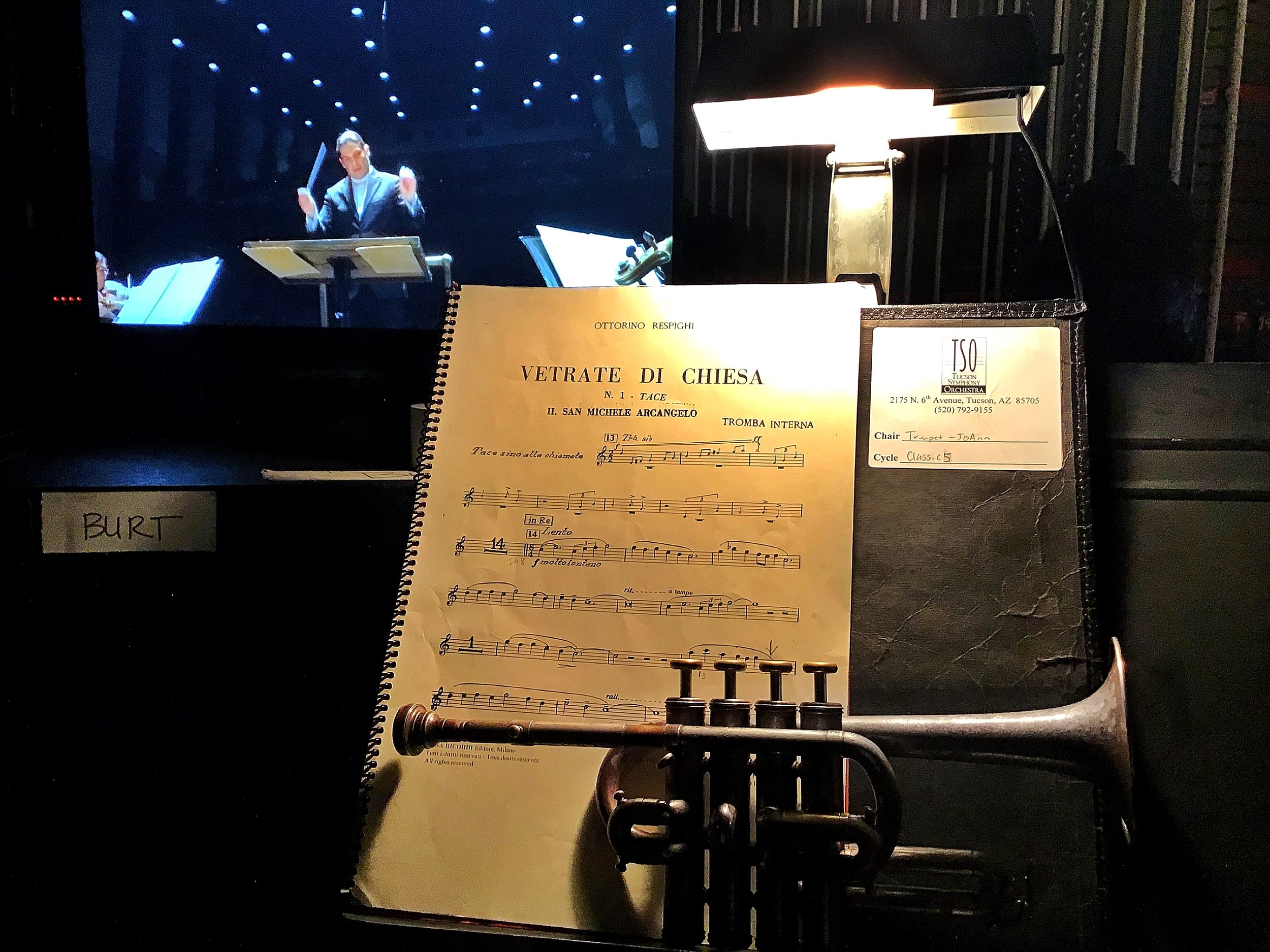Navigating the Off-Stage Solo
This post is about a unique experience I had in January 2020 with the Tucson Symphony. I was originally playing third trumpet on Respighi's Church Windows. If you don't know the piece, you should check it out. Typical Respighi tone poem goodness with beautiful moments. About a month before I was scheduled to go out to play, I was asked if I wanted to switch parts and play the off-stage solo in the second movement, St. Michael the Archangel. Personally, I thought it would be fun for a few reasons. I've never done it before, I don't get to play piccolo that often in public and I really like to experience new things. There was one reason to say no and it was a selfish one. The on-stage parts are really great and I was looking forward to playing them with Hayato and Betsy. They are an awesome section!
The first and foremost reason to say YES, I was hired to play extra and help out the section wherever they need. That is your #1 role as a substitute musician to an organization. The issue they were looking to avoid, the principal player who is playing a high loud part prior would have to hurriedly get off stage in about 12 measures, switch to piccolo trumpet and play very pretty, lyrical and high. That type of writing is not easy nor is it practical. In these times it doesn't seem conventional for one person to do both parts. The writing Respighi uses in Pines of Rome with the off-stage solo works well for the principal player to walk off stage, get in position, play the same trumpet beautifully, then get back on stage before the next entrance.
Another reason I said yes, I've never been hired to play an off-stage solo and then barely play the rest of the concert. I did play on another piece on the program, but it was on the second half of the and it was a short movement from a mass. The last time I played an off stage solo was in Ives, The Unanswered Question. The situation wasn't as elaborate as this one. I played in a dress rehearsal and then the concert later that day. The stage and hall were much smaller. And it may have been 15 years ago. It's a whole other experience to have to sit through four rehearsals and two concerts, barely play and keep yourself ready to play at anytime. More on that....
Third reason I said yes.... Reality is since I mostly play second trumpet in an orchestra, I don't have many opportunities to play piccolo trumpet in public. Every year, I play it at the major holidays at a cathedral. In the last five years, off the top of my head, I have played B minor Mass, Magnificat, Messiah and maybe a few others but I think that's it. So to play a pretty part on piccolo was appealing to me when the opportunity presented itself.
Playing a two minute off-stage solo on the the piccolo trumpet was a very different experience than I ever imagined. I have played off stage in short section parts in Mahler 1, Mahler 8 and the bucina parts in the Pines of Rome. Typically at work, I'm holding a C trumpet and sitting right next to who I have to match and play in tune with. This time I was mostly holding a cold piccolo trumpet, sitting off stage, in the dark with a shell muffling who I need to play in tune with. There is also a slight difference in how the pitch sounds since I'm not right next to who I'm playing with. The rule of thumb off-stage is you will sound flat to the stage. So between that and my piccolo going cold, I found out I pushed in too much to compensate. Where I was off-stage, I was in tune to my ear with what I heard and I listened back from my phone just to hear the pitch (Sorry TSO, I did erase it). But that was not accurate to what they were hearing on-stage. It was sharp and I had no idea. As someone who is generally listening around a lot and adjusting at work this was really weird to not trust my instinct. I found a way to adjust and be as comfortable as I could be. There was a spot before I came in where the orchestra was playing a solid Forte and I could check my pitch. Once I found that, I was golden!
Second new issue with this experience, I am used to sitting on stage and playing most of the rehearsal. During this week I had to show up to the hall, check the rehearsal schedule and wait until they were rehearsing the one movement I was playing in during a 2 1/2 hour rehearsal. I had to stay mentally engaged and my chops had to be responsive and ready to play the piccolo trumpet. So I would go downstairs to the dressing rooms and practice for an estimated amount of time, sometimes 20 minutes, 30 minutes, etc.. Then walk back upstairs and see where they were in the rehearsal. But I couldn't play too much either since I needed to sound fresh on the picc and play high. I also got a lot of reading done in my book that week. So the whole week was a balancing act. But so are most things!
The most difficult aspect of the experience revealed to me that I need to get comfortable with uncertainty faster. During the first couple of rehearsals, we had to find the best place for me so the conductor, Jose Luis Gomez, could get the sound he wanted. He's great by the way. I hope I and the musical world see more of him! It was determined I would play with a monitor to see the conductor. So we tried having me face different directions and move farther away. Ultimately, I wasn't that far away on stage right and faced the wall with the orchestra to my back. It was interesting to feel like I was physically in another world with the muffled orchestra sound I heard but I felt very engaged by Jose when it was my time to play. He made me feel comfortable to really sing on the beautiful melody. For me it was a very rewarding musical experience. Thanks Jose!!
The dress rehearsal and concerts were another story. They were far less stressful and fun! For the 7:30pm concert, I showed up around 7:20 in street clothes and sneakers. I warmed up the piccolo, playing a few scales for about five minutes. I knew Church Windows didn't start until 7:55 or so then tack on another 6-7 minutes for the first movement. So at 7:30, I sat down and ate my dinner, a burrito and chips and listened to the orchestra from backstage. When Church Windows started, I went over to my chair and stand backstage and set up. I sat down and waited. When the second movement started I played a few notes to see where the pitch was and got engaged in the piece. Checked the pitch again a little over two minutes later then conducted myself during the low brass lead in just before the solo. It was time to sound St. Michael the Archangel in heaven without the devil.....I played! After the solo was over, I put my chair and stand to the side so no-one would trip over them. Then I got up and changed into the rest of my concert black and dress shoes.When the piece was over I got into position for the stage door to open, walk out and take a solo bow. As a primarily second trumpet player, you do not solo bow much. So I had to make a conscious thought to remember to be ready to do that and take my down vest off...lol!
This was a great experience to have and I think if you are ever given an opportunity to play an off-stage solo, you should take it. I learned a lot so I can do a better job in the future. It was a lot of firsts for me. Playing a piccolo trumpet solo offstage, not listening and adjusting for pitch as if I'm sitting in the orchestra, trusting a different spot is in tune than what your gut tells you, and finding a way to stay mentally engaged and ready to play at any point. I'm extremely thankful and greatly appreciate that Hayato, Betsy and the TSO trusted me to join them on this wonderful piece. It has been one of the highlights of my 19-20 musical life!
#TucsonSymphonyOrchestra #ChurchWindows #Offstagesolo #trumpetperformance #orchestra #piccolotrumpet #JoseLuisGomez #StMichaeltheArchangel #Respighi #musician


